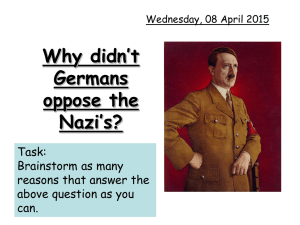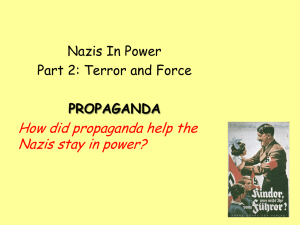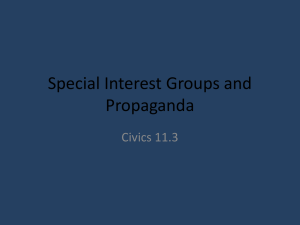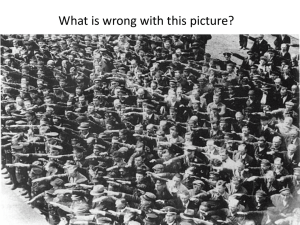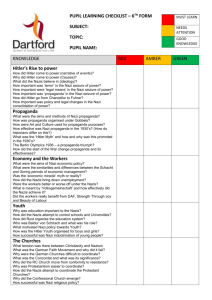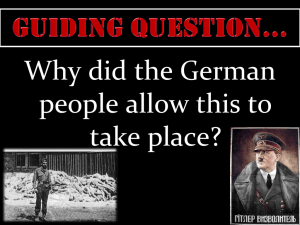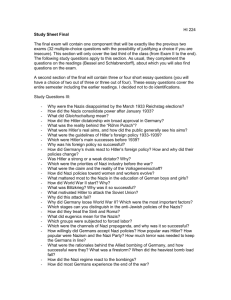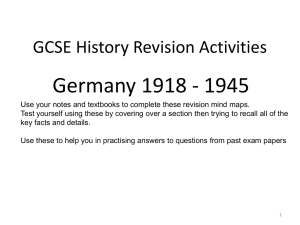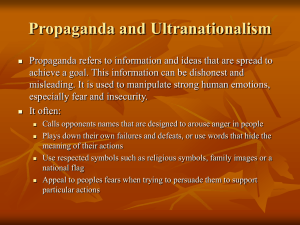Exam focus: OCR: Nazi Germany
advertisement
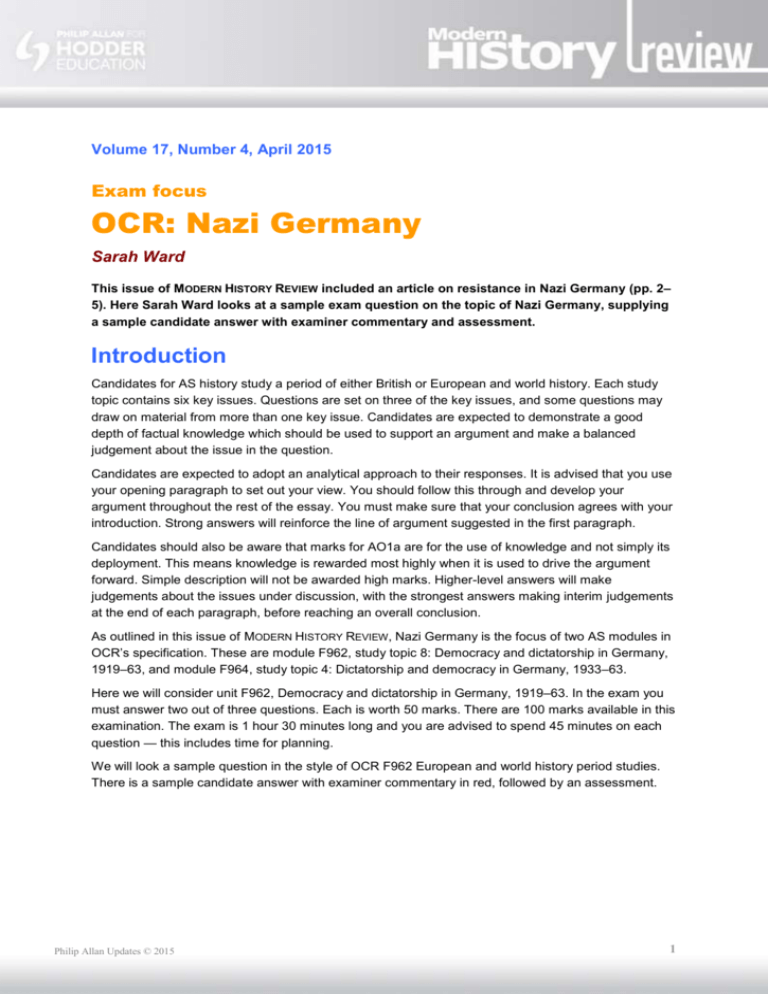
Volume 17, Number 4, April 2015 Exam focus OCR: Nazi Germany Sarah Ward This issue of MODERN HISTORY REVIEW included an article on resistance in Nazi Germany (pp. 2– 5). Here Sarah Ward looks at a sample exam question on the topic of Nazi Germany, supplying a sample candidate answer with examiner commentary and assessment. Introduction Candidates for AS history study a period of either British or European and world history. Each study topic contains six key issues. Questions are set on three of the key issues, and some questions may draw on material from more than one key issue. Candidates are expected to demonstrate a good depth of factual knowledge which should be used to support an argument and make a balanced judgement about the issue in the question. Candidates are expected to adopt an analytical approach to their responses. It is advised that you use your opening paragraph to set out your view. You should follow this through and develop your argument throughout the rest of the essay. You must make sure that your conclusion agrees with your introduction. Strong answers will reinforce the line of argument suggested in the first paragraph. Candidates should also be aware that marks for AO1a are for the use of knowledge and not simply its deployment. This means knowledge is rewarded most highly when it is used to drive the argument forward. Simple description will not be awarded high marks. Higher-level answers will make judgements about the issues under discussion, with the strongest answers making interim judgements at the end of each paragraph, before reaching an overall conclusion. As outlined in this issue of MODERN HISTORY REVIEW, Nazi Germany is the focus of two AS modules in OCR’s specification. These are module F962, study topic 8: Democracy and dictatorship in Germany, 1919–63, and module F964, study topic 4: Dictatorship and democracy in Germany, 1933–63. Here we will consider unit F962, Democracy and dictatorship in Germany, 1919–63. In the exam you must answer two out of three questions. Each is worth 50 marks. There are 100 marks available in this examination. The exam is 1 hour 30 minutes long and you are advised to spend 45 minutes on each question — this includes time for planning. We will look a sample question in the style of OCR F962 European and world history period studies. There is a sample candidate answer with examiner commentary in red, followed by an assessment. Philip Allan Updates © 2015 1 Sample question and answer Question ‘The use of propaganda was the main reason for the lack of opposition in Nazi Germany.’ How far do you agree? Answer with commentary There are lots of reasons why there was not much opposition in Nazi Germany. The Nazis took power in 1933 and were opposed to anyone who disagreed with them. They put laws in place and put people in prison if they were not Nazis, and some groups of people like Communists were really hated by them. It is true that there was lots of propaganda, and people were often persuaded by it because it was aimed at all different people not just Nazis. This introduction is fairly weak. The candidate does provide some reasons for the lack of opposition in Nazi Germany, and does include propaganda. On the other hand, there is also some very general and vague material that does little to introduce the argument of the candidate or give any context. A good answer might include a direct answer to the question, concerning the importance of propaganda to the lack of opposition. It may well give some context in relation to the question but it should be specific rather than very general. In Nazi Germany there was a lot of use of terror. There were the Gestapo who would spy on people and imprison them. There were also the SA and the SS. These were units of Nazis who were set up early in the Nazi movement to attack people opposing the Nazis and threatening its leaders. When the Nazis came to power they attacked anyone that were seen as opponents, and were allowed to do so by the Nazi party. People who believed in the ideas of the Nazis would spy on their neighbours and would inform on people and sometimes even attack them themselves if they thought that they were enemies of the Nazi people and the Nazi regime. The SS was led by Heinrich Himmler and he controlled the SS and also the Gestapo. He commanded these groups to arrest people who were political opponents like Socialists as well as those who for other reasons were not acceptable to the Nazis, like Jews and gypsies and gay people. Many people were executed and this meant that people were scared to oppose the Nazi party and the Nazi regime so it looked like there was no opposition to it. Here the candidate has picked one theme to begin with, although they give no rationale for doing so — they do not say how important they believe this factor to be. It is frequently better to start with the factor named in the question (in this case propaganda) and to explain its importance, before moving on to the other factors in order of importance. In terms of what the candidate does write, it is rather garbled and descriptive. Although there is some slightly more detailed material in this paragraph (e.g. it names some opposition groups and some groups persecuted by the regime), it is mostly very general. Instead of focusing on explaining and analysing the reasons why terror suppressed opposition in Nazi Germany, it describes what the terror was. Propaganda is obviously important to why there was no opposition because it fooled people into thinking that the Nazi policies were right and that everything would be better if the Nazis were allowed to carry out their policies. This also carried on in the war too as the government tried to make everyone think that they were winning and that they were fighting for the right reasons. Dr Joseph Goebbels was the man in charge of this policy and he made sure that there was much propaganda sent out to the citizens of Germany to persuade them. The propaganda included films and radio Philip Allan Updates © 2015 2 programmes as well as posters and newspapers that people could read. They also tried to persuade the audience that the racial stereotypes were right and that it was right to persecute the Jews, for example in the film The Eternal Jew. It made Hitler into a God figure too in films like Triumph of the Will which was made by the film-maker Leni Riefenstahl. There was propaganda aimed at mothers to persuade them to stay at home and have children, and also propaganda for young people like at the Nazi Youth. It was very important and I certainly think that it was one reason for the lack of opposition. It was very important. The candidate clearly knows more about propaganda material than the other factor so far. They give some specific examples of propaganda films and do provide some explanation of the possible purposes of propaganda. It is still fairly descriptive, however, as it is once again not focused on why propaganda was so important to the lack of opposition. The candidate asserts that it was ‘very important’ but does not explain why. It seems in the first sentence as though the candidate will go on to explain and analyse the factor but this is not carried through. There is some slightly incorrect use of terminology — ‘Nazi Youth’ instead of ‘Hitler Youth’ — and, as in the rest of the answer, there are no specific dates or incidents referred to, so there is little sense of chronology here. Some people were Nazis from the start and they did not oppose the Nazis because they were Nazis and they wanted the Nazis to stay in power and achieve their aims. These people were involved in the persecution. They thought that Germany needed to be put first and that the Versailles agreement was wrong because it was unfair. They thought that the Jews and other people were to blame for the agreement and for the economic problems that had happened afterwards. Because the war was successful at first this meant that they thought Hitler was right. They did not see that the Nazis were wrong and that they would fail, because they wanted them to be right. People like businessmen supported Hitler because they thought he would bring back prosperity and because they thought that Communism would win otherwise and take their businesses away from them. Military support was also important because many thought Hitler would make Germany’s army great again. This is an important factor, and it is good that the candidate has considered this alongside the more obvious factors of propaganda and terror. That said, the material in this paragraph suffers from similar problems to that in others — vagueness, descriptive passages, lack of specific information and analysis. There is again no indication of the importance of this factor and the candidate does not really attempt to address this issue. The reference to ‘the Versailles agreement’ provides some indication of the level of historical knowledge of this candidate. In conclusion I agree that the propaganda was the most important factor in the lack of opposition but the others were also important. This conclusion is inadequate — it asserts that propaganda was the most important factor but does not explain why. It does not ascribe any particular level of importance to the other factors. It also does not really match the introduction, although this may have been due to the candidate running out of time. A good conclusion should be able to draw together the argument, restating and explaining the reasons why each factor was important, as well as the level of importance that each factor had. Assessment This is a poor answer. It has no overall argument, provides little explanation of the importance of each factor, and gives little specific or detailed evidence. Historical information is provided as description rather than in support of explanation, argument or analysis. The factors are not linked, although this would only have been possible had the candidate provided an argument concerning their relative importance. Philip Allan Updates © 2015 3 This answer would achieve a level IV overall. For AO1a (knowledge, recall, selection and use of evidence) it achieves level IV, 12. There is relevant knowledge deployed but it is extremely variable in level of detail. It is not inaccurate or irrelevant, however, despite being frequently generalised. For AO1b (analysis and judgement) it would achieve level IV, 13. It is largely descriptive and the limited points that are made about importance are little more than assertions. Understanding is patchy and limited. AO1a: level IV, 12 AO1b: level IV, 13 Total marks: 25/50 This resource is part of MODERN HISTORY REVIEW , a magazine written for A-level students by subject experts. To subscribe to the full magazine go to: http://www.hoddereducation.co.uk/historyreview Philip Allan Updates © 2015 4
